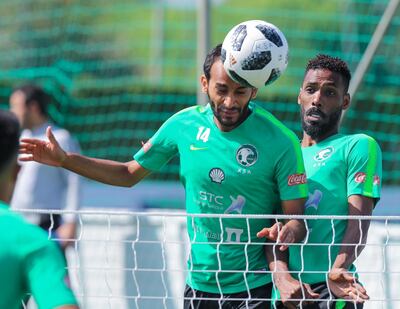It is no surprise anxious footballers suffer restless evenings in the build-up to the start of a World Cup. Yet ahead of next month’s tournament, sleepless nights will be inevitable for some players given the fasting obligations associated with Ramadan.
The holy month, which started on Thursday, demands abstinence from food and liquids during daylight hours, making the following few weeks of final preparations a delicate balancing act for Muslim players such as Mohamed Salah, Paul Pogba and Eden Hazard.
Fasting has proved a matter of friction for coaches in previous years with France manager Didier Deschamps calling it “a touchy subject” in 2014 and Jose Mourinho, while at Inter Milan, substituting Sulley Muntari after 30 minutes, questioning the Ghanaian’s ability to fast and play in warm weather.
However, for seven national teams this month – Saudi Arabia, Egypt, Iran, Morocco, Tunisia, Senegal and Nigeria – it is not only one or two players observing the holy month, but rather the bulk of the squad.
In the case of Saudi, while FA president Adel Ezzat said the players had received special dispensation to postpone their fasts, several sources with the team suggested they will fast intermittently whenever they can.
They returned to Riyadh on Wednesday after three weeks of high-intensity training in southern Spain. They will spend the first three days of Ramadan with family before flying to Zurich on Saturday for the start of their final preparation camp.
Nick Worth, a sports physiotherapist who has worked in the Premier League with Manchester City and Wigan Athletic as well as in the UAE with Al Jazira, said the concern with intermittent fasting is that the body never gets the chance to fully adapt.
“Doing it on an intermittent basis, the body never understands, whereas if you are fasting consistently, your body gets used to the energy and requirements and adapts,” Worth said. “It would be better to avoid fasting for the duration of the tournament and leave it to a later date.”
But team manager Omar Bakhashwain said his staff are very calm with the situation, pointing to previous years for examples of how they have shown they can cope.
"When you travel, you can delay the fast – you are not obligated," he told The National. "But we can manage it very well with the players, I am sure. We have played during Ramadan before, it is not a problem.

"Our qualification was during Ramadan – when we played Japan and Australia – so we know how to deal with it. Also our league in Saudi has been played throughout the holy month. We can manage these things; it's not going to be difficult, believe me.
"You will see the team playing at a very high level. We are prepared and everything that is required, we will do it.”
While day-length in Riyadh and Zurich is much the same at around 13 hours and 15 minutes, the team will fly to their World Cup base in St Petersburg on June 8, six days before their curtain-raiser in Moscow.
On their first day in Russia, the sun in St Petersburg will rise at 3.40am and set at 10.15pm, meaning fasting will equate to more than 18 hours without food or liquids.
“We will respect completely whatever the players decide,” Saudi Arabia's Argentine head coach Juan Antonio Pizzi said. “We have to be respectful.
"We as a technical staff will explain to them what they will face at the World Cup in terms of the level of competition, so they will have all the information available to them and can make their own decision in a complete way.”
______________
Read more:
WATCH: Ramadan and everything you need to know
Salah's boots to be displayed at the British Museum
Richard Jolly's take on England WC2018 selection
______________

Team chef Mohammed Abdul Fatah is Egyptian, but has worked with the Saudi federation for more than a decade and grown to know their preferences. His speciality is saleeg, a traditional Saudi dish consisting of chicken served on a bed of white rice cooked in milk broth.
But he also prepares balanced, high-nutrition meals using potatoes, fish, pasta, and lamb. The players like their potatoes fried, but Abdul Fatah resists.
“The difficulty is that Muslims in Ramadan traditionally break their fast with high-sugar and high-energy foods because that's what they are culturally used to,” Worth explained. “Their bodies crave energy and they are used to eating a lot of sweet or fried foods.
"But as athletes they have to understand the sensitivities of a healthy diet. They will still crave the high fats, but that's obviously not the best thing to prepare for a tournament.”

